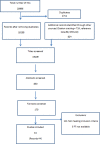Reducing delay in patients with acute coronary syndrome and other time-critical conditions: a systematic review to identify the behaviour change techniques associated with effective interventions
- PMID: 30997136
- PMCID: PMC6443141
- DOI: 10.1136/openhrt-2018-000975
Reducing delay in patients with acute coronary syndrome and other time-critical conditions: a systematic review to identify the behaviour change techniques associated with effective interventions
Abstract
Background: Time to treatment in many conditions, particularly acute coronary syndrome, is critical to reducing mortality. Delay between onset of symptoms and treatment remains a worldwide problem. Reducing patient delay has been particularly challenging. Embedding behaviour change techniques (BCTs) within interventions might lead to shorter delay.
Objective: To identify which BCTs are associated with reductions in patient delay among people with symptoms or conditions where time to treatment is critical.
Methods: The data sources were Cochrane Library, MEDLINE, EMBASE, Cumulative Index to Nursing and Allied Health Literature, and PsycINFO. Study eligibility criteria include intervention evaluations (randomised controlled trials, controlled clinical trials and cohort studies) involving adults (aged >18 years) and including an outcome measure of patient delay up to August 2016. Study appraisal and synthesis methods include screening potential studies using a transparent, replicable process. Study characteristics, outcomes and BCTs were extracted from eligible studies.
Results: From 39 studies (200 538 participants), just over half (n=20) reported a significant reduction in delay. 19 BCTs were identified, plus 5 additional techniques, with a mean of 2 (SD=2.3) BCTs and 2 (SD=0.7) per intervention. No clear pattern between BCTs and effectiveness was found. In studies examining patient delay specifically, three of four studies that included two or more BCTs, in addition to the two most commonly used additional techniques, reported a significant reduction in delay.
Conclusions: Around half of the interventions to reduce prehospital delay with time-critical symptoms report a significant reduction in delay time. It is not clear what differentiates effective from non-effective interventions, although in relation to patient delay particularly additional use of BCTs might be helpful.
Trial registration number: CRD42014013106.
Keywords: acute coronary syndrome; delay: behaviour change; education; psychology.
Conflict of interest statement
Competing interests: None declared.
Figures
References
-
- Ho MT, Eisenberg MS, Litwin PE, et al. Delay between onset of chest pain and seeking medical care: the effect of public education. Ann Emerg Med 1989;18:727–31. - PubMed
-
- NICE Chest pain of recent onset: assessment and diagnosis, 2010.
-
- Roffi M, Patrono C, Collet JP, et al. 2015 ESC Guidelines for the management of acute coronary syndromes in patients presenting without persistent ST-segment elevation: task force for the management of acute coronary syndromes in patients presenting without persistent ST-segment elevation of the European Society of Cardiology (ESC). 10.1093/eurheartj/ehv320 - DOI
-
- Scarborough P. Trends in coronary heart disease 1961–2011, 2011.
Publication types
Grants and funding
LinkOut - more resources
Full Text Sources





